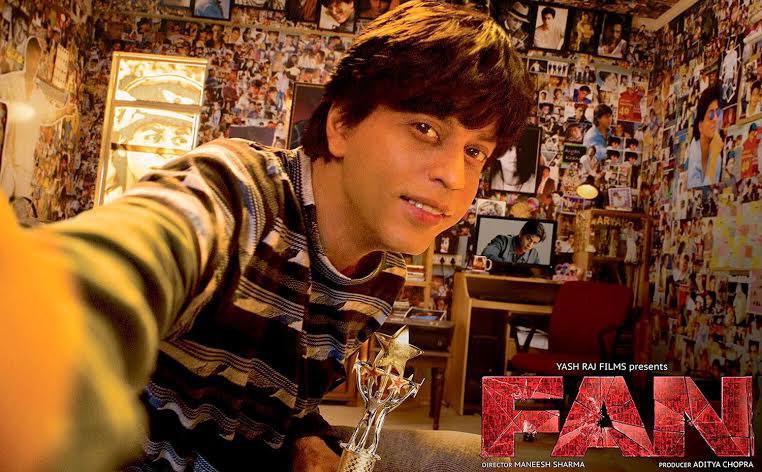 Image
Image
Fanning frenzy
Shah Rukh Khans film Fan raises significant questions on the behaviour of fans but fails to tackle the moot question, feels Shoma A. Chatterji, citing what psychologists say about idol worshipping
Shah Rukh Khan’s latest film Fan is woven around a fan whose entire life revolves around his screen idol till he is so obsessed with his icon that he reduces the life of the very man he worships to a man terrified of his stardom. Sadly, the film ignores the psychology of fandom.
Dr. Sanjay Chugh, senior consultant of psychologist, Delhi, points out that the word ‘fan’ is a short form of the word ‘fanatic’ which refers to someone getting driven to frenzy due to his devotion to a deity. “We all have had our fan moments and have some icon or role model whom we look up to. It’s absolutely normal for a fan to follow everything in the media related to the idol. However, when it begins to cross the line and enters into the terrain of imbalance and pathology, one needs to pull in the reins.”
This is true of Gaurav Chenana, the fan in the film whose parents go all the way encouraging his preoccupation of his idol, Aryan Khanna, both portrayed by Shahrukh Khan. They are thrilled by their only child’s capacity to imitate his hero and the accolades he earns doing the same . But reality is more terrifying than what happens in the film. Simple small town folk as that they were, they do not realise how dangerous this obsession is for their son. He says his life is meaningless if his idol does not want him.
Real life provides scarier stories. When the good-looking Hollywood actor Rudolf Valentino died suddenly at age 31, several women committed suicide. Four women fans of Marilyn Monroe killed themselves when she died in 1962 of an overdose of barbiturates.
India is no different. One fan of Amitabh Bachchan walked backwards from Baroda to Mumbai when the star was almost dying at Breach Candy hospital after an accident on the sets of Coolie. A samosa seller went to Big B after he was discharged with a truckload of samosas. He asked him to touch it once and then distributed the samosas to the many fans gathered outside. This, of course, is highly abnormal behaviour for the person/people concerned but this does not affect the star except the embarrassment at such iconisation.
An Amitabh Bachchan Fan Club in Kolkata has not only constructed a temple dedicated to him but has even sourced the pair of shoes he wore in Agnipath which is kept it on the chair he sat on in Aks performing aarti too!
A fan of Hema Malini reportedly came all the way from Pakistan and gate crashed into her home. Her father is reported to have suffered a heart attack because the man carried a knife to force his way in. a woman fan of Rajesh Khanna committed suicide after getting married to his photograph because she filed to marry him.
In this country , fandom has been more or less exclusively attached to film stars, sports stars and politicians (in the south) and less to music idols, say, like for the Beatles in the West. In 1963, the media gave birth to a term that lives to this day – Beatlemania. The Beatles were invited to perform at the northern border of Scotland and England. By then, they had scored a No 1 album and three No 1 singles. “It was as if a hurricane had blown into town,” wrote Dorian Lynskey in The Guardianreminiscing about the event. The nervous local police insisted that the concert promoter Andi Lothian bring the Beatles on early to sate impatient fans, though his bouncers were still in the pub.
“Throughout 1963 there had been reports of teenage girls screaming, crying, fainting and chasing the band down the street; police escorts were required. But catchy new words have a magical power in the media. Once it caught on, it seemed to cement the phenomenon in the collective imagination,” Lynskey recalls. Synonyms for crazy fans are – ‘geek’, ‘cult’, ‘stalking’ and ‘hysteria.’
“Lots of different fans are seen as strange,” says Dr Ruth Deller, principal lecturer in media and communications at Sheffield Hallam University, who writes extensively about fan behaviour. “Some of that has to do with class: different pursuits are seen as more culturally valuable than others. Some of it has to do with gender. There’s a whole range of cultural prejudices. One thing our society seems to value is moderation. Fandom represents excess and is therefore seen as negative."
The situation in the South India is different. They turn their idols into gods and goddesses and build temples and statues of their idols regularly. Actress Khushboo has a temple dedicated to her.
The danger signals are evident when, according to Chugh, “Beyond a point, fanaticism becomes an escape from one’s own reality. People who tend to go overboard are typically those who may have a low self-esteem, self - loathing, sense of inadequacy, and mental instability.” When a fan begins to stalk his hero/heroine, tries to collect a strand of hair, or an object he has used such as a jacket or a top, sends messages to him via his cell-phone, or gate-crashes into his home clandestinely, then the fan is a maniac who needs psychological counselling and treatment.
Chugh says, “When we talk about fanaticism, let’s be clear that we are not referring to regular fandom, admiration, or idolisation. The latter are things that the idol would perhaps enjoy and feel motivated with. However, once this crosses the line and becomes fanaticism.”
Sadly, in his haste to prop up his falling image as hero and demonstrate his ability to do action roles with a psychological twist, Shah Rukh Khan in Fan has missed out on the opportunity of digging deep into the psychology of fandom as we understand it.
Top Headlines
-
Entertainment
Bollywood 2025: Hits, Hype and Heartbreaks as Dhurandhar Redefines the Year
December 24, 2025
-
Entertainment
Rotary Club of Calcutta East Central celebrates centenary of iconic actor Santosh Dutta with statue unveiling
December 04, 2025
-
Entertainment
Valentyn Vasyanovychs To The Victory! wins 2025 TIFF Platform Award unanimously
September 26, 2025
-
Entertainment
Chlo Zhaos Hamnet Wins TIFF 2025 Peoples Choice Award
September 20, 2025
-
Entertainment
Sholay: Golden even after fifty years
July 04, 2025
-
Entertainment
War 2: Check out Hrithik Roshan, Jr NTR and Kiara Advani's new posters
June 26, 2025
-
Entertainment
LGBTQIA+: Icelandic film Odd Fish and Brazil's Baby win big at KASHISH 2025 film festival
June 12, 2025
-
Entertainment
Katrina Kaif named Maldives tourism global brand ambassador ahead of Modi's visit
June 10, 2025
-
Entertainment
'Queen marches to conquer': Deepika Padukone joins Atlee's AA22xA6 starring Allu Arjun after 'Spirit' exit
June 08, 2025
-
Entertainment
Dakota Johnson and Chris Martin, who were in on-and-off relationship, broke up: Reports
June 06, 2025


